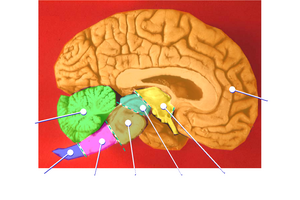 |
| Human brain |
Scientists at Northeastern University have found that a section of the brain called the amygdala is the region that is involved in how adults interact socially. Lisa Feldman, distinguished Professor of Psychology, led the research to examine how our brain impacts social decisons.
What the research found was the size of Amygdala in the human brain correlates with our social networks in terms of size and complexity.
Barrett says this about the findings, "We know that primates who live in larger social groups have a larger amygdala, even when controlling for overall brain size and body size," said Barrett. "We considered a single primate species, humans, and found that the amygdala volume positively correlated with the size and complexity of social networks in adult humans."
The study examined 58 participants who completed questionnaires that involved the size and intricacies of their social networks. Then each individual had a magnetic resonance imaging brain scan to assess brain size. What researchers found was that link consistent with what scientists call the "social brain" hypothesis. This hypothesis states the human brain evolved to deal with the increasing complexities of modern life.
Individuals who have decision-making problems and difficulties in making effective social relationships fail at what some experts call the standards for social interaction. These are the unwritten rules of engagement that provide people with specific boundaries of behavior that involve how one sets benchmarks for what is appropriate and what is not. How an individual is able to meet or not meet these standards is often used as a diagnostic tool for assessing young people for special education. Social impairment is considered to be one of the criteria for determining a category of learning disability and how education is provided by schools.
These standards help personal growth and the building of relationships. When social perception is impaired, the individual can't interpret what is socially acceptable and what is not. They are therefore apt to make mistakes that others might not make. Just like the young woman described
in the beginning of this article, these individuals may have problems keeping a job or making the right choice in a mate.
Social impairments have been tied to the brain's function and the amygdala in studies as well as Alzheimer's disease. Scientists believe that by studying this region of the brain they will learn more about these diseases to provide intervention and therapeutic strategies for both children and adults.